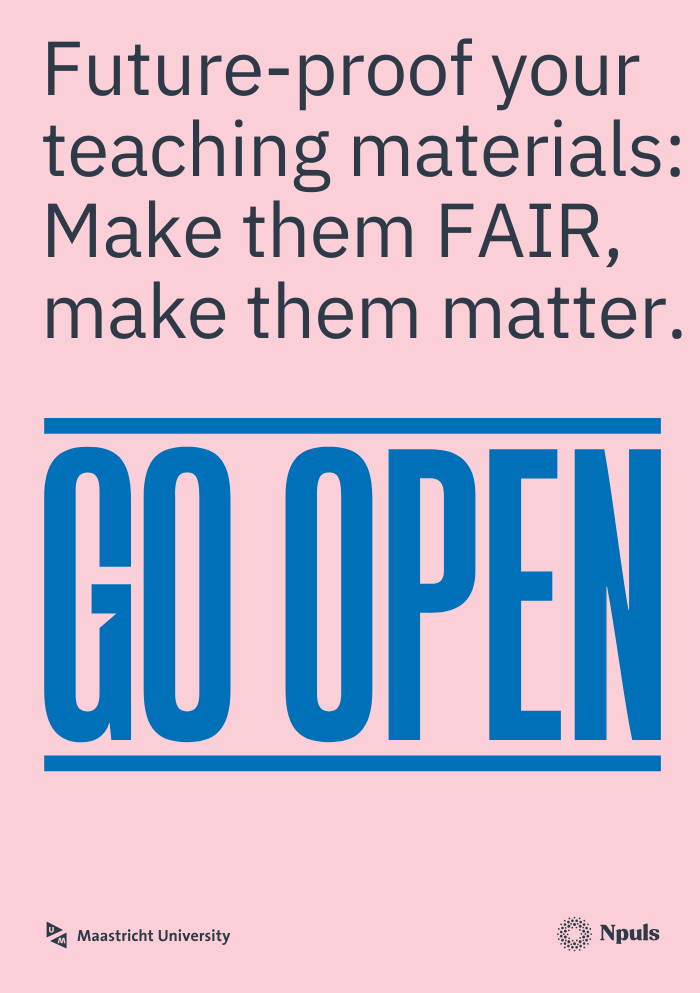By participating in the national Npuls OpenUP scheme, we are taking an important step towards a more sustainable, accessible, and innovative educational landscape. Our efforts align seamlessly with the international academic Open Science movement, which promotes the (re)use and creation of open educational resources (OER).
As part of our commitment to fostering open education, we actively participate in the Npuls GO OPEN awareness campaign, which promotes the adoption of OER and practices across institutions.

Why Open Science in Education matters
Maximising impact
Your teaching materials deserve a wider audience. By licensing your resources (e.g., with Creative Commons), assigning Digital Object Identifiers (DOIs), and sharing them openly on a dedicated repository, you ensure they are FAIR (Findable, Accessible, Interoperable, and Reusable), reducing the risk of commercial misuse. This approach extends the reach of your classroom content to benefit learners worldwide. Your work gains visibility beyond UM, creating opportunities for collaboration and recognition. This wider reach doesn’t just help others—it enhances your own academic profile and extends the influence of your teaching far beyond what was previously possible.
Breaking barriers and fostering innovation
Open Science removes traditional barriers around educational materials, making it easier for students and educators at UM, across Dutch higher education, and internationally, to access knowledge that might otherwise be out of reach. Sharing teaching resources openly supports global knowledge exchange, reduces financial pressures on students, and lowers institutional costs associated with copyrighted materials. This makes education more affordable and accessible, aligning with the principle that publicly funded education should benefit all. Open Educational Resources (OERs) promote a more equitable learning environment while enabling UM students and staff to benefit from materials shared by colleagues across the Netherlands and beyond. This mutual exchange strengthens the wider educational landscape and contributes to lifelong learning.
At the same time, Open Science in Education encourages a culture of collaboration and shared learning, where teaching materials can be reused, adapted, and continually improved. For instance, UM academics could co-create an interdisciplinary sustainability case study combining economics, biology, and policy studies—then publish it as an open resource. This invites feedback and contributions from peers around the world, enriching the content with diverse perspectives. Such openness not only accelerates teaching innovation but also enhances student engagement, empowering learners to take an active role in shaping their education.
What can you do with Open Educational Resources?
Open Educational Resources (OER) are teaching, learning, and research materials (digital or otherwise) freely available under open licences such as Creative Commons. These licences allow unrestricted use, adaptation, and sharing for educational purposes. OER can range from a single handout or image to full textbooks and online courses.
We support your journey
The Open Science in Education team provides personalised guidance through every step of your open education journey. We offer comprehensive support in various aspects of finding, (re)using, creating and sharing educational resources including licensing, copyright navigation, citation tracking, and repository selection. We ensure that your materials are shared effectively, maximising their visibility and potential impact.
Ready to publish educational resources?
We offer this support for all faculty members—whether you’re just beginning to explore open practices or ready to publish comprehensive educational resources.
OpenUP & GO OPEN?
Join our practical one-hour workshop designed to help you transform your teaching resources into materials that are FAIR. You will receive practical guidance on licensing, improving your content, and increasing your reach through open-access publishing. By the end of the workshop, you’ll have a concrete plan to open up your teaching content and contribute to a more accessible and innovative educational landscape.
